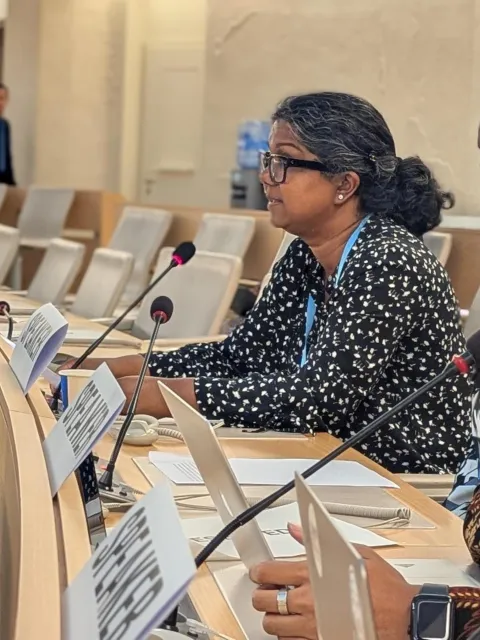NCDs and COVID-19: using law to act on NCDs during the pandemic

COVID-19 is an unprecedented public health emergency that has taken over news headlines and global health agendas. Governments and health officials are mobilising like never before to control the spread of the virus and care for people who have been infected.
This all-hands-on-deck approach was clear at the 73rd World Health Assembly (WHA) meeting in May 2020, where just one resolution was passed: a response to COVID-19. It was also reflected in a recent informal survey of McCabe Centre alumni, many of whom reported that their work as government lawyers and policymakers had been partly or entirely consumed by responding to COVID-19.
Throughout this enormous pandemic response, evidence has emerged showing that COVID-19 – a communicable disease – is deeply connected with the world’s biggest killers: non-communicable diseases (NCDs). People living with NCDs appear to be at greater risk of dying from COVID-19, and certain NCD risk factors may increase the chances of contracting and getting sicker from the virus. Despite these connections, a recent World Health Organization (WHO) country survey found that COVID-19 has caused widespread disruption to services for NCDs.
NCDs – including cardiovascular disease, cancer, diabetes, chronic respiratory disease, and mental health – are already responsible for more than 70% of deaths globally. Given their emerging links with COVID-19, addressing NCDs must be an essential part of the pandemic response.
Law and policy will be important tools in this response. Though policymakers’ capacity may be limited during the pandemic, COVID-19 and NCDs are not separate issues, and actions taken to address one will invariably impact the other.
Why NCDs must be part of the COVID-19 response
Though the world is still learning about COVID-19, early studies have shown that the majority of people who have died or have become severely ill from COVID-19 had comorbidities like hypertension, diabetes, cancer, and other common NCDs.
NCD risk factors have also been linked to increased risk of contracting COVID-19 and worse outcomes once someone is infected. WHO has noted that smoking, for example, involves putting a hand to the mouth (which may increase transmission of the virus) and can impair lung function (which may make it harder to fight off the disease). Alcohol use may also increase vulnerability to COVID-19 because of the toll it takes on the immune system.
The link between NCDs and communicable diseases is not new. The main risk factors for NCDs (air pollution, alcohol and tobacco consumption, physical inactivity, and unhealthy diets) have long been linked to communicable diseases such as HIV/AIDS and tuberculosis. The 2018 High-Level Political Declaration on NCDs called for the integration, as appropriate, of responses to NCDs and communicable diseases. Other global governance instruments such as the Global Alcohol Strategy have also highlighted the relationship between NCD risk factors and communicable diseases.
The need to continue work on NCDs has been acknowledged in responses to the current pandemic, including in the WHA resolution on COVID-19, which mentions the importance of continuing population- and individual-level services for NCDs. WHO recommends member states take steps to strengthen national governance to include NCDs in national COVID-19 response plans, and NCD-focused organisations have emphasised the importance of integrating NCD prevention and control into COVID-19 plans.
How NCDs are already part of the COVID-19 response
COVID-19 has forced governments to make unprecedented public health law and policy decisions, many of which have significant implications for NCDs.
Lockdown measures, for example, have forced countries to determine what activities they deem “essential”. WHO EURO recommends that alcohol not be deemed essential during the lockdown, advising countries to continue with previously identified “best buy” alcohol control measures including reducing alcohol availability, advertising and sponsorship, and increasing excise tax measures.
While many countries deemed alcohol “essential”, South Africa chose to ban the sale of alcohol entirely during its lockdown – a heavily scrutinised decision that was challenged by the alcohol industry. While in effect, the ban was credited with reducing violence and hospital admissions. In the days after the ban was lifted on 1 June, South African hospitals saw a surge in trauma admissions. It is not suggested that alcohol should be banned after COVID-19, yet South Africa’s experience shows that strong alcohol control measures in line with the WHO “best buys” are effective.
On the other hand, physical activity has largely been deemed essential, with many of the strictest lockdown measures permitting people to go outside and exercise. Many cities are also prioritising physically active forms of transportation by strengthening their walking and cycling infrastructure to provide alternatives to crowded trains and buses. This could help reverse the decline in walking and cycling as a means of transportation in certain countries noted in the WHO Global Action Plan on Physical Activity 2018-2030.
Lockdown measures have unintentionally led to reductions in another NCD risk factor: air pollution. For example, early studies from China suggest these improvements to air quality have had positive impacts on human health, highlighting the possibility of a green recovery after the pandemic. Disruptions to food supply chains caused by COVID-19 have also inspired calls for the Pacific Islands, where NCDs were declared a crisis in 2011, to renew focus on traditional ‘healthier’ diets after the pandemic rather than revert back to a reliance on commonly imported unhealthy products that have been implicated in the crisis. In Fiji, the government has distributed seeds to locals to ensure direct access to nutritionally rich food.
Individual-level decisions in response to COVID-19 could have major implications for NCDs, as well. For example, one study found that as many as 300,000 UK residents may have quit smoking during the pandemic, recognising evidence that tobacco use – an NCD risk factor – makes them more vulnerable to the virus. At the government level, some countries such as Guam, Australia, and the Philippines have chosen to amplify public campaigns to quit smoking during this time.
Opportunities to act on NCDs as part of the pandemic response
COVID-19 has created a historic moment where the world recognises that health should be a priority, and laws and regulations aimed at protecting public health have been implemented at speed. With that moment comes unique opportunities to shape public health policy now and for years to come.
The significance of this moment is not lost in the industries producing unhealthy products. There is preliminary evidence that some alcohol companies have ramped up advertising and promotions during the pandemic, and the tobacco industry is hunting good publicity by donating personal protective equipment and ventilators, all the while pushing a product that makes people more vulnerable to the virus. This is occurring despite recognition by parties to the WHO Framework Convention on Tobacco Control that there is a “fundamental and irreconcilable conflict between the tobacco industry’s interests and public health policy interests."
The all-consuming nature of COVID-19 might make it difficult to talk about anything else, and policymakers may have limited capacity to target NCDs specifically. But NCD prevention and control are more important now than ever. By drawing attention to the relationship between communicable diseases and NCDs, governments have the opportunity to implement a policy with appropriate laws and regulations that address both.
Seizing this opportunity will require building regulatory capacity to address NCD risk factors and enabling collaboration across different sectors beyond just health. Now is the time to work together to act on NCDs, and in doing so, build healthier and more resilient populations through this pandemic and the next.
Last update
Thursday 06 May 2021Share this page


